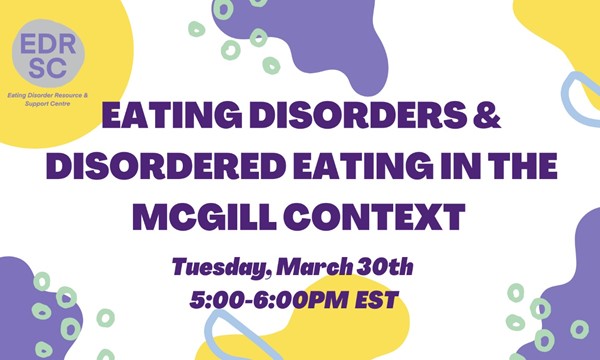Event
Eating Disorders/Disordered Eating in the McGill Context (2020-2021)
Tuesday, March 30, 2021 17:00to18:00

Join the EDRSC for our final event of the school year, a discussion group to open up the conversation and provide support regarding the current influence of the McGill environment (2020-2021) on eating disorders and disordered eating habits. Topics include: how the COVID-19 pandemic has impacted the student-life of McGillians, and, more specifically, how it has potentially affected the ED behaviour/recovery of McGill students. Discourse surrounding graduation from McGill will also be addressed as well as the connection between EDs and financial difficulties.
FACILITATORS:
✰ Zuzana Navratil (she/her)
My name is Zuzana, I’m a general volunteer and active listener for EDRSC.
My name is Zuzana, I’m a general volunteer and active listener for EDRSC.
✰ Cody Esterle (they/he)
I am the general coordinator and one of the founders of the EDRSC, recovered from an ED, trans, nonbinary, and a graduate from this trash school/ past executive for its student society.
✰ Deborah Gallou (she/her)
My name is Debbie, and I am a Support Group volunteer with the EDRSC. As a Support Group volunteer, I facilitate remote, 2-hour support sessions every week with individuals who are either in recovery from an ED, considering recovery from an ED or struggling with disordered eating.
✰ Paloma Hepler (she/her/elle)
I am a co-founder and coordinator of the EDRSC, and my knowledge of eating disorders and related topics is informed by lived experience and self-directed research. I am a social service worker entering the nursing field.
I am a co-founder and coordinator of the EDRSC, and my knowledge of eating disorders and related topics is informed by lived experience and self-directed research. I am a social service worker entering the nursing field.
LAND ACKNOWLEDGEMENT: While this event is happening virtually, the EDRSC is based in Tiohtiá:ke, colonially known as Montreal. Therefore, we must acknowledge that this entire island is located on unceded and unsurrendered Indigenous land. The Kanien’kehá:ka Nation is recognized as the custodians of the land and water on which we gather today. Tiohtiá:ke has historically been an important meeting place for different Indigenous nations. We must recognize the unique and disproportionate hardships Indigenous people have faced and continue to face as a result of colonialism. It is important to not only acknowledge these hardships but to also actively resist colonialism and neo-colonialism in the diversity of forms they take, as we stand in solidarity with Indigenous peoples. We encourage settlers to acknowledge their privilege and question how they are working to be anti-oppressive every day.